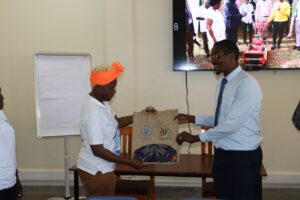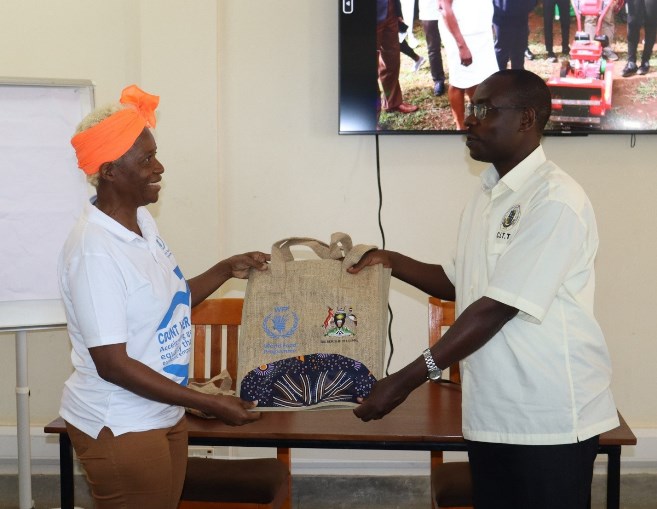World Food Programme Delegates visit CITT on site seeing visit
It was a jovial mood on Tuesday March 12 2024 as the Center for Innovations and Technology Transfer (CITT) hosted a delegation of visitors from World Food Program on a site seeing and benchmarking visit. The delegation from WFP was led by Madam Emily Doe the Head of Area Office. The guests were received by the Director for Center for Innovations and Technology Transfer; Dr. Medard Twinamatsiko alongside Dr. William Wasswa the Deputy Director for CITT, Dr. Ronald Twongyirwe from the Faculty of Interdisciplinary Studies and Dr. Prudence Kemigisha from the Faculty of Business and Management Science.
Dr. Medard Twinamatsiko gave a brief presentation and overview of CITT and its strategic role in spearheading the development of innovations institutionally in Mbarara University as well as regionally. Dr. Twinamatsiko also commended WFP for inviting members of MUST academia and the innovations ecosystem to the launch of the World Food Program Self Reliance Model (SRM) in Isingiro District on the 27th of February 2024. Dr. Twinamatsiko pointed out that CITT follows a holistic model of encouraging multidisciplinary teams to solve identified community challenges using evidence-based innovations. He pointed out that these innovators in the MUST ecosystem could be key resources towards the success of the Self Reliance Model. Dr. Twinamatsiko also gave an overview of the ISOFT flagship project that has excelled in Agriculture and contributed to stronger food security systems. He mentioned that WFP could benchmark on the successes of the ISOFT project in implementing the Self Reliance Model.
Dr. Ronald Twongyirwe, who is also the Head of Department for Agriculture and Livelihood Systems in the Faculty of Interdisciplinary Systems, gave the visiting delegation an overview of the Bachelors of Agriculture and Livelihood Systems program offered at MUST. He mentioned to the delegation that the methods of instruction for the program lead to the nurturing of social-entrepreneur agricultural graduates that support food security and development of efficient agricultural systems. Dr. Twongyirwe concluded his presentation by highlighting a few key consultations the Department has conducted on the areas of feeod security and food reliance. Dr. Prudence Kemigisha then discussed the business aspect of the Self Reliance Model and the contribution of MUST to this aspect of the Model. Mr. Ivan Mujuni, the Cocreation Lab Manager for CITT, gave the guests a brief tour of the CITT Cocreation Space and explained the importance of a Cocreation Space in an Innovation ecosystem.

Ms. Emily Doe from World Food program then gave remarks on behalf of the visiting delegation. She started by appreciating MUST and CITT for their presence at the launch of the Self Reliance Model. She also appreciated Dr. Medard Twinamatsiko for hosting her and the WFP delegation on this benchmarking visit. Ms. Emily Doe further expressed awe at the tremendous work CITT is doing in nurturing innovations that have the ability to scale and earn huge commercial value but also solve a great number of community challenges. Particularly, she mentioned she was pleased with the ISOFT Project and its direct linkage to food security and climate change. Emily Doe then went on to further explain the concept of the Self Reliance Model and its intended impact to the refugee communities. She mentioned that MUST is a key partner for the Model to ensure sustainability after the donor funds are depleted. She concluded her remarks by handing over souvenirs to Dr. Twinamatsiko and Dr. Twongyirwe for their active participation towards the launch of the Sustainable Reliance Model.
The Delegation then broke off for discussions that were followed by site visits to the various innovation projects at Mbarara University. The guests were taken to the PHARMBIOTRAC Production facility where they were taken through the production methods for production of herbal medicines and also the methods of value addition to agricultural products by turning them into commercially viable pharmaceuticals, cosmetics and other products. The visiting delegation were shown the MRI lab where a low field MRI Machine is being built to image conditions such as hydrocephalous in children. The tour was concluded at the ISOFT Demonstration Site where some of the members of the ISOFT Club demonstrated to the WFP Delegation practical ways of making NPK Fertilizer from farm animal and crop residue and also how to convert the invasive Tithonia plant into fertilizer. At the ISOFT site, the visitors were also shown how to produce biogas for energizing homesteads from plant and animal waste. The delegates from WFP expressed their amusement at the ISOFT Model and also spoke about its direct linkage to the Self Reliance Model in refugee communities.
The visit was concluded by a debrief and the teams agreed to follow up with the action points for a strong collaboration between the two institutions of Mbarara University of Science and Technology and World Food Program.







